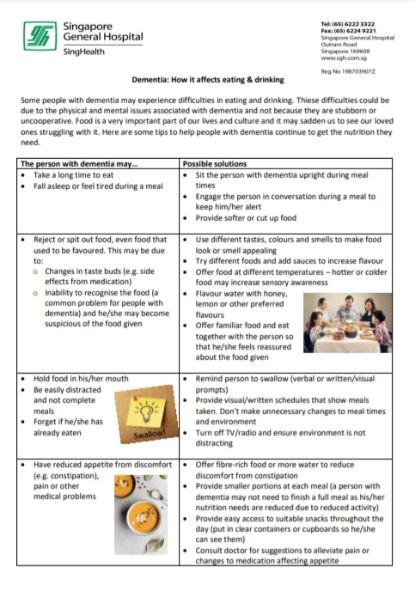Playback speed:
How Can You Improve the Eating Environment?
While it is essential to pay attention to the nutritional aspects of a meal by providing regular, healthy and balanced meals, another important aspect of meals for persons living with dementia is the eating environment. As eating is a social activity, creating a comfortable dining atmosphere can help boost the appetite of a person living with dementia.
Some tips on creating a comfortable eating environment:
- Provide opportunities to eat together with others, but be mindful of group size. Too large a group can get noisy and distracting.
- Reduce unnecessary distractions (e.g. TV, household chores) unrelated to eating.
- Ensure that there is a selection of various foods.
- The colours of the food, plate, and table should be different and contrasting.
- Avoid the use of patterned plates to prevent confusion.
How Can You Improve the Appetite of a Person Living With Dementia?
We are aware of all the good and nutritious foods like walnuts and green leafy vegetables that persons living with dementia need to keep their brain health in the best possible condition. However, what if persons living with dementia refuse to eat? For most people without the condition, eating and having our meals promptly happens most naturally.
Singaporeans are known to live to eat, some going beyond the recommended three square meals a day with ease. For persons living with dementia, mealtimes are not so straightforward.
Due to problems with chewing, swallowing or digesting, eating sometimes becomes a difficult chore. With their diminished sense of taste and smell, food that was once delicious may also lose their allure, leading to some seniors losing interest in eating. Often, the effects of memory loss may also confuse them into thinking they have already eaten, resulting in them eating less. If a person living with dementia is on medication, some prescriptions can also affect appetite and increase the likelihood of constipation, making their eating and digesting process more difficult.
In the process of caring for someone living with dementia, it can get frustrating when getting them to tuck in to a meal. These are some tips that may ease the process:
- Let them choose what they want to eat.
- Provide regular snacks or small meals rather than setting designated mealtimes.
- Make the look and smell of the food appealing and appetising.
- Do not overload the plate with too much food. Small and regular portions work best.
- Use brightly-coloured plates to help make eating interesting and distinguish food better.
- Encourage the person living with dementia to get involved with mealtimes, such as asking them to help in preparing the food or laying the table.
- Maintain eye contact with them during mealtimes, and continuously guide them back their to eating when they pause.
- Invite familiar people to join the meal and provide company. However, minimise conversations during mealtimes, as they may be too over-stimulated or distracted to finish their meal





